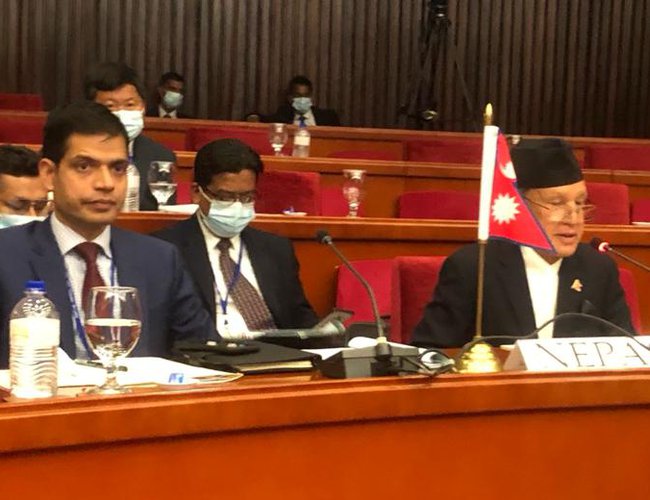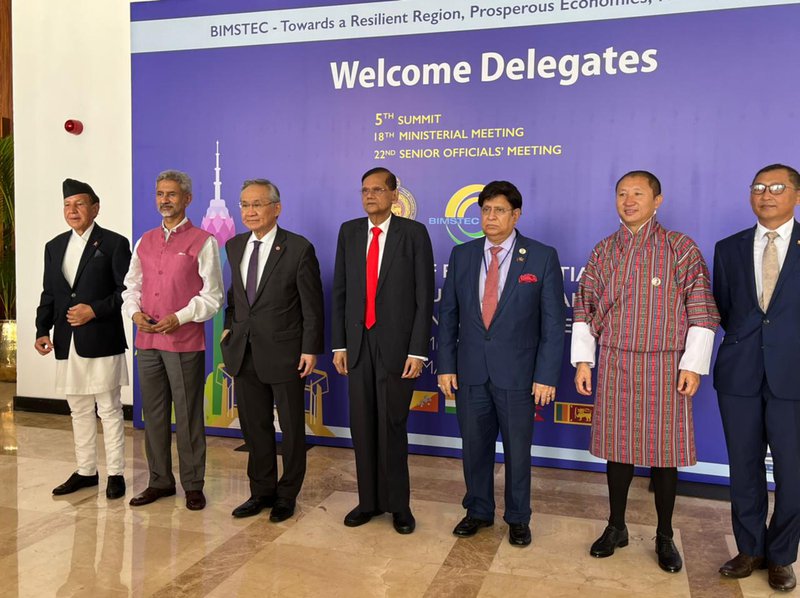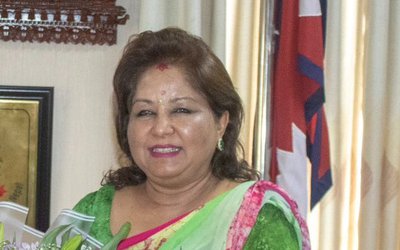
As we continue to embrace new working modalities during these unprecedented times, the value of in-person meetings and interactions is becoming increasingly more evident. We may have become better in using technologies and meeting virtually, but nothing can substitute human touch in diplomacy. It is also in this light that I appreciate the opportunity to meet and interact with you all in this beautiful and historic city of Colombo.
We have just turned our calendar into the Spring season. Spring is a natural harbinger of optimism, purpose, and motivation. With COVID-19 raging across the world, the last two years taught us to moderate our expectations and exercise caution. Now that the virus surge seems to be slowing down, we all look forward to brighter prospects of partnership and cooperation among countries in our region and beyond.
The pandemic seriously impaired the work of our organization over the last two years. It compelled us to defer our Summit and its preceding meetings for some time. However, our resolve for regional unity and solidarity was never dimmed. Our gathering here today is a testament to this shared commitment.

When I talk of hope, purpose, and positivity, I am reminded of the ideals of peace, freedom, and economic well-being the founders of BIMSTEC had envisioned in the 1997 Bangkok Declaration, the very edifice of regional cooperation in the Bay of Bengal region.
Since then, BIMSTEC has developed as our collective identity connecting South and Southeast Asia; embodied our collective desire to tap on the rich natural, cultural, and human resources for socio-economic development; and represented our aspirations for a better integrated and prosperous region. Our age-old civilizations, deep historical linkages and shared values have inspired us to work in unison for our peoples and countries.
BIMSTEC has made some notable achievements over the last 25 years. The establishment of the Permanent Secretariat in Dhaka in 2014, the adoption of important legal instruments, and sector-specific cooperation in the areas of agriculture, connectivity, security, trade and investment, technology, tourism, and culture, among others, are some of the key milestones in the history of our Organization.
The Fourth BIMSTEC Summit held in Kathmandu in 2018 was a breakthrough in renewing the focus on much needed institutional reforms and restructuring. It laid a foundation for more result-oriented organization including through the call for drafting of the Charter and reorganization and rationalization of the areas of cooperation.
We are happy that initiatives mandated by our leaders in Kathmandu would culminate, during the Summit tomorrow, through the adoption of the Charter and endorsement of the rationalization of sectors in seven clusters.
In addition, signing of the Convention on Mutual Legal Assistance in Criminal Matters, MOA on the Establishment of BIMSTEC Technology Transfer Facility, and MoU on the Cooperation between Diplomatic Training Institutions will be an important step forward. The adoption of the Master Plan for Transport Connectivity will be critical in promoting transport linkages through land, air, and water.
These new instruments would, for sure, bring fresh momentum into the BIMSTEC process. It is upon us to ensure their honest and time-bound implementation.
Despite all these achievements, the road ahead remains tough and challenging. Our region is still plagued by poverty, unemployment, and inequality. Each year, the region suffers from various forms of natural disasters. Climate change, global warming and environmental degradation pose existential threats to the people and the planet.
The COVID-19 pandemic has only compounded the challenges.
We will not be able to address these challenges with the usual tools in such unusual times. What is needed then is to pivot away from the business-as-usual approach and devise innovative pathways befitting the current unprecedented circumstances.
BIMSTEC must not be left to languish in the absence of sufficient political will.
We must work together to uplift people’s lives and livelihoods, create equal opportunities for them, and ultimately realize the aspirations of a peaceful and prosperous region.
We must ramp up our collective efforts to combat the current pandemic. Free, fair, equitable and universal access to vaccines must be ensured for everyone, everywhere.
Promoting pro-poor, inclusive and equitable growth is a must to eliminate poverty and destitution and to attain the Sustainable Development Goals. We need to update and effectively implement the BIMSTEC Poverty Plan of Action in line with our changing priorities in the new context.
An early establishment of the BIMSTEC Development Fund (BDF) will help accelerate the development projects and sector-specific activities.
As multidimensional connectivity is a key enabler for regional integration, we must promote deeper integration of our trade and transport networks. Promoting connectivity through railways, airways, waterways, and information ways must be explored.
In view of the region’s huge energy requirement for industrial and infrastructural development, we must ensure an early implementation of the BIMSTEC Grid Interconnection Agreement. We need to decarbonize energy solutions, ensure a breakthrough on transition to clean and renewable energy, and leverage energy actions for advancing sustainable development.
Building economic ties through nurturing trade and investment linkages paves the way for effective regional cooperation. Greater trade and investment cooperation boost resilience against shocks of various kinds. Priority should thus be given to finalize the constituent agreements of BIMSTEC Free Trade Area.
The mountains and the oceans are embedded intricately in the collective firmament and identity of the BIMSTEC region. The Himalayas echo the heartbeat of our planet, and the oceans reflect its tide.
However, it is sad to see that our mountains bear the heaviest brunt of climate change. Mountain glaciers are retreating and ice sheets are losing mass. The depth and extent of snow cover in high mountains has declined.
Therefore, we need urgent, transformative efforts to protect the mountain ecology and combat climate crisis.
Nepal attaches high priority to the BIMSTEC process. As the lead country for people-to-people contacts, we remain committed to promoting cultural ties, touristic links and people-to-people contacts in a spirit of mutual benefit and cooperation.
As we wrap up our preparations for the Fifth Summit, we are already on the cusp of 25th anniversary year of our Organization. We must inject the energy necessary to revitalize the BIMSTEC process to make this year a momentous anniversary year. This will require our renewed resolve, collective commitment, and concerted actions. Nepal remains committed to contributing constructively to ensure that BIMSTEC delivers better for our peoples, our countries, and our region.
Excerpts of the Statement by Minister of Foreign Affairs of Nepal Dr. Narayan Khadka at the Eighteenth BIMSTEC Ministerial Meeting
Held during the Fifth BIMSTEC Summit in Colombo.
- The Sentiment Of Monetary Policy Seems Focused On Increasing Eemand: FNCCI President Chandra Prasad Dhakal
- Jul 26, 2024
- Monetary Policy 081/82 Is Making The Economy More Dynamic: Governor Adhikari
- Jul 26, 2024
- Global IME Bank And Shashila Motors Signed Agreement Regarding Electric Vehicle loan
- Jul 26, 2024
- Lok Bahadur Thapa, permanent representative of the UN in New York, was appointed as the Vice President of ECOSOC
- Jul 26, 2024
- Leeladevi Gadtaula Became The First woman Chief Secretary
- Jul 26, 2024
















